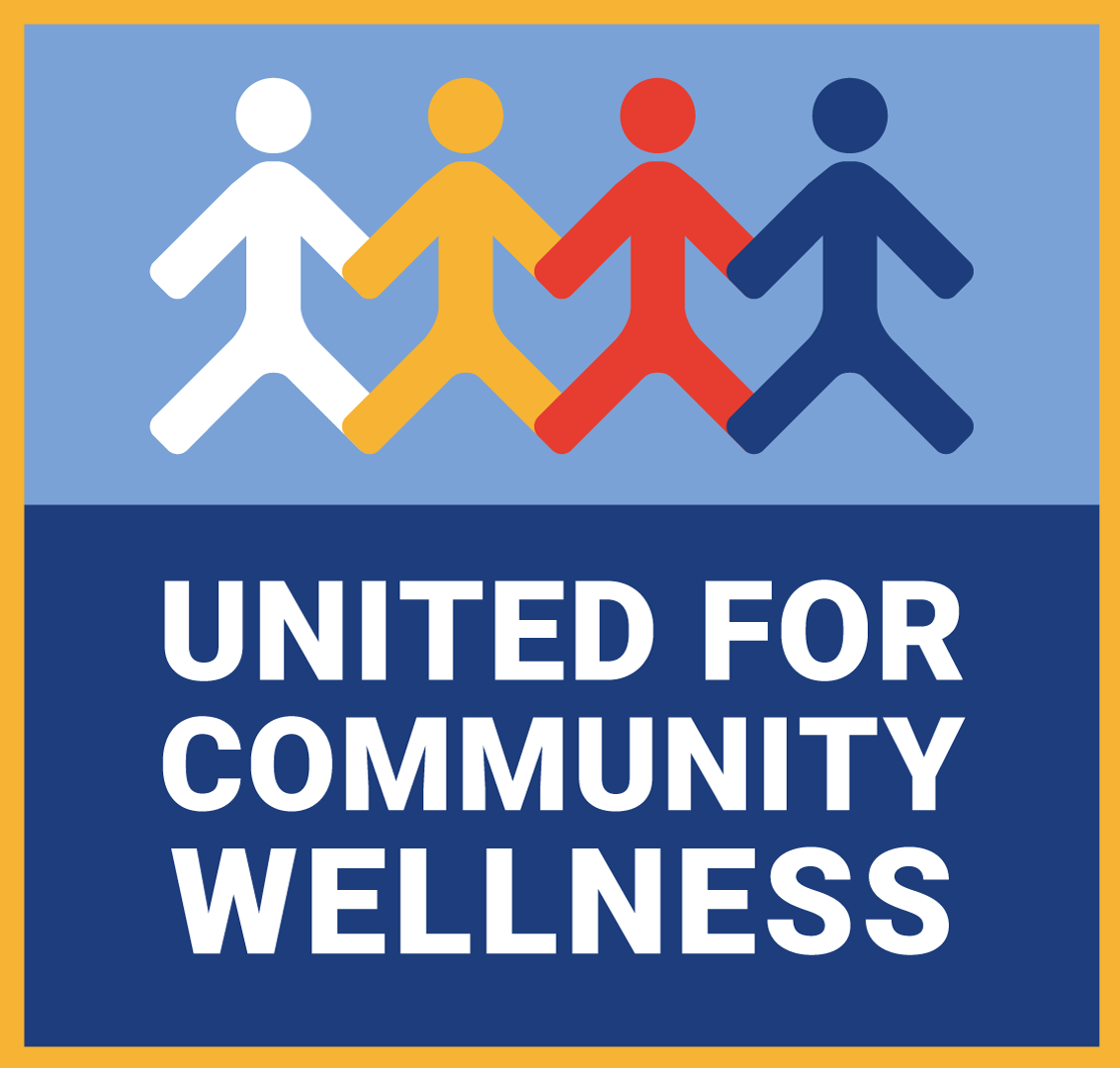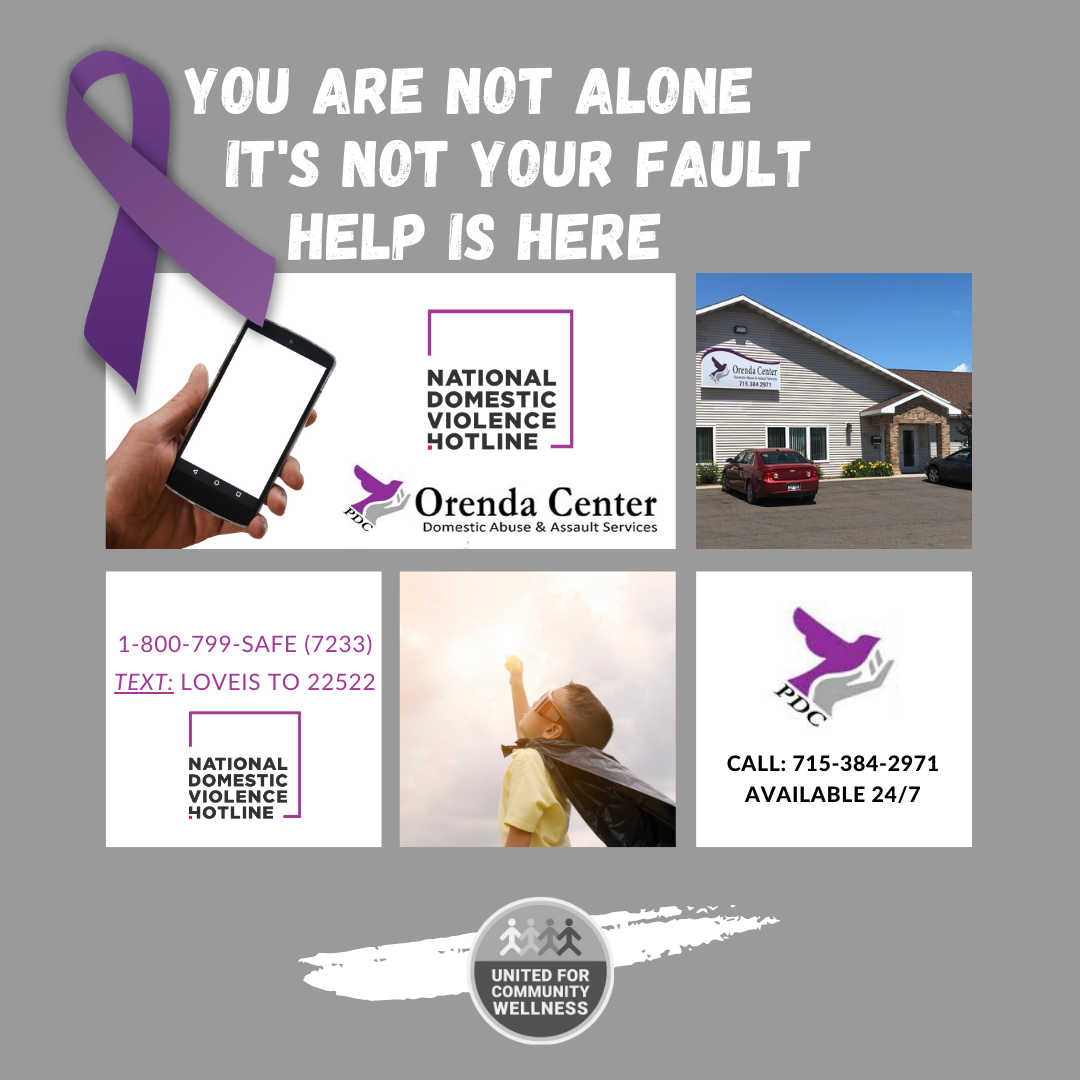Domestic Violence Awareness and Prevention
Intro Post:
Domestic violence impacts every community. Help is available.
- National Domestic Violence Hotline 1-800-799-SAFE (7233) If you are unable to speak safely, you can log onto thehotline.org or text LOVEIS to 22522.
- In Marshfield, PDC Orenda Center provides comprehensive advocacy and support for individuals impacted by domestic/dating violence/abuse and sexual assault. Services include crisis intervention, emergency shelter, medical advocacy, compassionate support, legal advocacy, educational resources, and referral services. All services are free of charge.

Video:
https://fb.watch/2oCMMUYFIP/
Website/Article/Email:
SIGNS YOU ARE EXPERIENCING ABUSE
- Your partner threatens or tries to control you
This can be anything from making you feel inadequate to telling you what to wear or how to look. - You partner controls your money
Keeping cash or credit cards away from you or discouraging you from working is unacceptable. - Your partner isolates you
Cutting you off from family and friends makes you even more dependent on your partner and could be a sign of abuse. - Your partner physically abuses you
This is a serious crime regardless of your relationship status.
https://nationaltoday.com/national-domestic-violence-awareness-month/
PDC Orenda Center Services
Personal Development Center (PDC) is a private, non-profit victim services agency providing case management, advocacy, and prevention education to individuals and families in the North Wood County and Clark County area.
- PDC is dedicated to the safety and empowerment of those impacted by domestic abuse and sexual assault.
- Our mission is to assist those in distress by identifying options and resources, promoting safety, building hope, and strengthening individuals, families, and our community through case management, advocacy, and education
Creating Safety Plans - Creating a safety plan is a vital step when one is considering leaving an abusive partner.
- This plan can help a survivor strategize what they will do to stay safe – and keep their children and pets safe – in the midst of abuse, be it to escape temporarily during an incident of violence or when they’re ready to leave their abuser for good.
- Why is a safety plan important?
- Leaving an abusive partner is notoriously the most dangerous time for a survivor.
- If an abuser feels they are losing power over their victim, they can become increasingly more controlling, threatening, violent or may even turn fatal.
- Here at PDC, we helped create 978 safety plans in 2019.
Supervised visitation and exchange services - so noncustodial parents can have time with their children.
- The visits are monitored by the coordinators and take place at PDC.
- The Safe Exchange program provides a safe pickup/drop off point for parents to exchange their children for periods of placement. Our families are usually court ordered to use our program.
- Before starting services, families must schedule an appointment to complete the intake/orientation process.
- PDC provided 336 supervised visits and 714 safe exchanges in 2019.
Youth Services
- PDC provides 1:1 advocacy to children and teens,
- Youth Advocates act as an additional support within the schools in our service area.
- PDC provides services for youth who are victims of any type of abuse, experience unhealthy dating relationships, have experienced sexual assault, or live in a home where any of these things occur.
- PDC provides prevention education to students of all ages.
- Healthy Relationships, Sexual Assault, Safe Touch & Establishing Safe Adults, Keeping Yourself Safe, Safety After High School.
- PDC also provides individual education on any of these topics.
- PDC’s Youth Advocates provided 3,000+ youth with prevention education presentations in 2019.
The Lethality Assessment Program (LAP) - an evidence-based lethality assessment instrument based on the research of Dr. Jacquelyn Campbell. LAP assists law enforcement and other community professionals to identify victims of intimate partner violence who are in high danger of being killed by their intimate partners.
- Once identified, the high-danger victim is immediately connected by hotline call to a crisis advocate at our agency for emergency safety planning, emergency shelter and follow-up advocacy if they so choose.
- LAP is an important tool, used as a part of a collaborative community effort, to objectively assess domestic-violence-related situations and make vital connections for victims/survivors with community organizations that are here to help.
- In 2019, there were 60 LAP calls connected with crisis advocacy.
Adult Advocacy - A plan is developed for each individual on a case by case basis.
- Advocacy for adults includes helping individuals understand and identify violence & sexual assault/abuse in relationships.
- Often victims do not recognize certain behaviors as abusive because they have been exposed to it for such a long time, which could have started in childhood.
- If necessary, we explore legal options to help increase safety, which could include assistance with filing paperwork for temporary restraining orders.
- Education and skill building are also options covered under adult advocacy services.
- Advocates can provide information regarding budgeting, interviewing skills, successful careers, coping skills, self-care, and higher education.
- Women In Search of Empowerment (WISE) is a support group held by an advocate at PDC and we also have held support groups in Clark County Jail for inmates who are victims.
- Advocates also work closely with community partners to provide other resources and referrals for AODA/Substance Abuse, housing options, food & clothing assistance, financial assistance, and others as needed.
Other Support Services
- PDC provides advocacy during Sexual Assault Nurse Examinations.
- This incredibly vulnerable time in a victim’s life is confusing, terrifying, and often revictimizing.
- Advocates are always on call to respond when a victim reports to the Emergency Room for a SANE.
- We provide emotional support and companionship throughout the entire exam if a victim wishes.
- PDC advocates and volunteers responded to 29 SANE exams in 2019.
- PDC support at the Child Advocacy Center (CAC) at the Marshfield Clinic –
- The CAC takes a Multidisciplinary approach to best serve the community.
- This approach makes the CAC a “one stop shop” and helps in the investigation process.
- This partnership plays a huge role in providing the best support for children and their families.
- At the CAC children can receive a medical exam by a Child Abuse & Neglect Pediatrician along with a forensic interview by a trained forensic interviewer.
- During the appointment at the CAC advocates provide one on one support during the duration of the time spent there. They provide resources, answer any questions, and keep the children and families’ company.
- PDC advocates responded to 98 cases at the CAC in 2019.
Emergency Shelter
- PDC-Orenda Center is also an emergency shelter for victims who may not have anywhere to go when escaping a violent home.
- Shelter advocates are always on site and ready to help our residents in anyway they may need.
- There are individual living quarters and a shared kitchen, large living room, computer space and child’s play area.
- Food is provided for residents to prepare and have meals as they wish.
- PDC also has a secure leisure area outside of the building including a large playset for children in shelter.
If you or anyone you know might need services, has questions about PDC services or are interested in volunteering please do not hesitate to call. Our phone is staffed 24/7 and advocates are ready to help.
PDC-Orenda Center
715-384-2971
505 E. Depot Street
Marshfield, WI 54449
